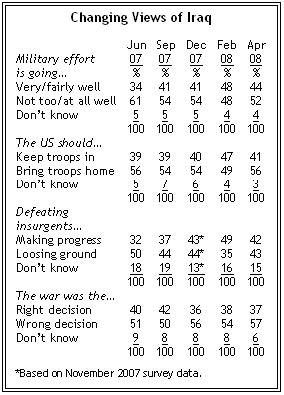by Andrew Kohut, President, Pew Research Center
Special to the New York Times
It turns out that Iraq is not the pivotal campaign issue that it seemed to be less than a year ago. Indeed, the war is no longer the top concern among voters.
A lot has changed with respect to Iraq in a relatively short period of time. Voters have come to feel better about the way the war is going, and with American casualties declining, there is more optimism about our efforts there. While most Americans still believe the war was a mistake, the percentages of people who think the war is going badly or believe that the United States is losing ground against the insurgents has decreased compared with a year ago. In short, while no less important, Iraq is a somewhat less pressing issue.
At the same time concerns about the economy — and prices specifically — have soared. In almost all rankings of issues in national opinion polls, the economy is No. 1 and Iraq is No. 2.

How the war will figure as an issue in the coming election is complicated by ambivalent and contradictory public opinions. One of the more interesting findings in Republican exit polls was that John McCain, despite his strong support for the war, was more likely to win the backing of voters who disapproved of the war, while G.O.P. supporters of the war voted for other candidates (most often Mitt Romney.) And surprisingly, a late April Pew survey found voters thinking that Mr. McCain could do a better job than Barack Obama or Hillary Clinton in handling the war by a 50 percent to 38 percent margin in Obama’s case and a 49 percent to 43 percent margin in Clinton’s case. A late May poll found a much closer division of opinion between McCain and Obama, 46 percent to 43 percent, but not one that favored the Illinois senator.
It’s noteworthy that these responses came from a public that largely thinks the war was a mistake (57 percent to 37 percent in the late April survey), a view that is a cornerstone of the Obama campaign. This suggests that the high regard for McCain on the issue is predicated on looking forward at how he might handle the war in the future than at his past record of support.


